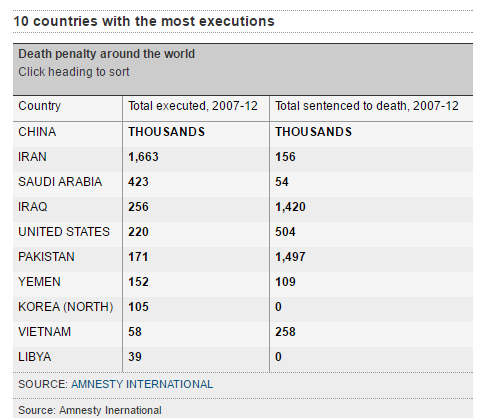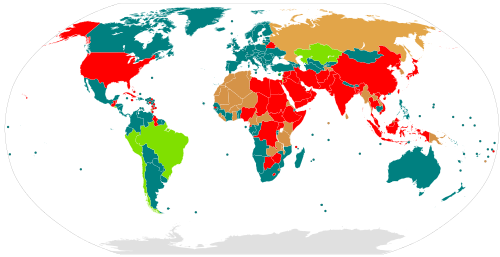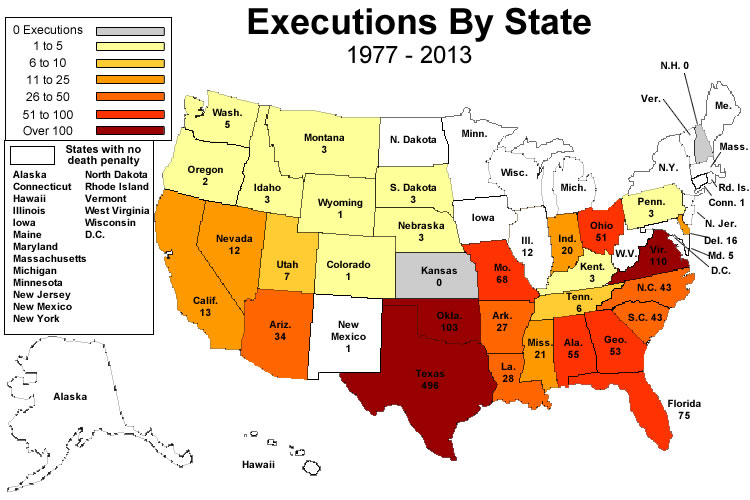Yes, but I am arguing the standard for taking away Life is substantially higher than for taking away Liberty. I think you would agree, we’re just arguing where the line is and how society balances the costs and risks.
No, I was suggesting it was a terrible thing to do, because it is an active action by society to take those rights away, and an action that is not necessary to take. That is, it’s a choice being made which has ethical implications.
By saying the criminal ceded is rights you were denying any responsibility from society towards capital punishment, laying the blame of the execution on the criminal. The criminal is guilty of the crime. If capital punishment is ethically wrong, the wrong regarding capital punishment is not done by the criminal but by the actors executing the process. Deflecting the (possible) blame to the criminal (for the punishment, not for the crime) is misguided.
I have no doubt capital punishment will be abolished somewhat soon in the US, barring a major conflict that shakes up the status quo and destroys the concept of West/free world/whatever we call it now (which sadly, is not out of the realm of possibility these days). The tendency is so clear (even the real application of the punishment within the US) that I don’t think it can be argued otherwise. When and if that happens, there will need to be soul searching as to why it was allowed to continue for so long, and the blame should be placed on the executors (the system not the individuals), not on the criminals executed.
The idea that an active action is different from a passive lack of action is mistaken. Both are choices, and both have consequences.
Your choice to expend resources on keeping a murderer alive, rather than expending those resources on improving the lives of innocents in society has ethical implications as well.
He is guilty of a crime which has pre-established punishments. He made that choice.
But this is immaterial, because it’s not an established fact. It is indeed the point of the discussion.
What percentage of such cases would you be happy to accept as collateral damage, where wrongfully convicted people are killed by the state?
Also, your central premise that the death penalty costs less than lifetime imprisonment without parole - there seems to be a lot of debate about whether or not this is actually true, what are you basing it on?
[quote=“Timex, post:543, topic:128049, full:true”][quote=“Juan_Raigada, post:542, topic:128049”]
By saying the criminal ceded is rights you were denying any responsibility from society towards capital punishment, laying the blame of the execution on the criminal. The criminal is guilty of the crime.
[/quote]
He is guilty of a crime which has pre-established punishments. He made that choice.[/quote]
And the society made a choice to make capital punishment the pre-established punishment. Besides the society has the option to condone the punishment, and since taking no action is the same of taking affirmative action, it doesn’t really move who is responsible for the decision.
I agree and have not said otherwise. I said that the action to execute is taken by society, not by the criminal. I agree a passive action has consequences.
And I think spending resources to keep a criminal fed instead of killing him outright is the better option rather than expending those resources on improving the lives of innocents (which, by the way, you fail to define and keep abstracting, because in reality those resources would really be dispersed and have negligible practical outcomes).
Since this statement is bullshit for more than 0% of cases, I do not support the death penalty.
That’s not to say I don’t think we as a society should kill truly evil people, because I do. I just think humans’ ability to decide who is and isn’t truly evil is abysmal.
I was just going to post the same thing, but you said it succinctly.
This is my issue and there are plenty of mistakes in our justice system.
Plus it ends up costing more than just locking them away forever most of the time anyway.
If it was used correctly, I’d have no problem with it, but it rarely is so I’m generally opposed to it.
Edit: As far as rights:
Committing the crime and being found guilty is the definition of due process. If you commit a crime you can lose rights. Felons can’t vote most places. Or own a firearm. You don’t have freedom of movement or association in prison.
What’s wrong with this picture?

A civil society has costs, including care for the indigent, mentally and terminally ill (i.e. people who will never be “productive.”) Now, granted, in these cases people aren’t choosing those afflictions. But the truly abhorrent individuals - e.g. killers who lack empathy - didn’t choose their brain chemistry, either. Costs borne by society include imprisoning those on the fringes; it’s not a binary choice between the costs of incarcerating the killer or the life of an innocent child.
Either killing people is wrong or it is not. The state is not exempted from that moral obligation because the families of the victim demand “justice” or because the state doesn’t want to bear the cost (not to mention a more robust mental health system that could catch and treat these people before they commit their crimes.) Ultimately murder and rape, as abhorrent as they are, are committed by people who have something wrong with them. If the rubric for dealing with these people is state sanctioned murder because “we can’t afford it” then state sanctioned murder for any crime deemed “extreme” by the state (e.g. treason) can also be sanctioned.
The rule of law should (ideally) rise above emotion or spreadsheet calculus.
.
I mean… the US population is much greater than everything other than China on that list combined.
Per capita matters a lot when dealing with these things. You’re also trust stats of nations that can’t be trusted. I’m pretty sure more than 105 North Koreans were executed in 5 years, but it’s not like they’re going to tell us about most of them.
Yeah, that isn’t how reality works. Was it wrong to kill the Nazis? Would it have been wrong to kill Stalin? Mao? Killing innocent people is wrong. Killing people in general is often necessary. If I walk into a mall with a shotgun and start firing at school kids, the cop that shoots me isn’t doing the “wrong” thing by stopping me.
Now having the state do it to citizens, there can be a case made there, I’ve seen people do it effectively.
Scott Greenfield is opposed to it and he’s not remotely a liberal, he spends most of his time making fun of liberals. He is extremely libertarian in many ways, but he’s also a lawyer who sees the reality of it.
He makes a good case against it.
Ok how about this picture instead:


Authoritarian states or extremely religious ones. That’s some great company to keep.
Ah, so Murica!
Russia not killing people.
Except you know, people they don’t like who mysteriously die of poisoning from polonium from Russian reactors.
Again, I’m not even a huge supporter of it, it has tons of issues.
That’s a good article, thanks for linking it.[quote=“ShivaX, post:553, topic:128049”]
Russia not killing people.
Except you know, people they don’t like who mysteriously die of poisoning from polonium from Russian reactors.
[/quote]
Feel free to put Russia as a red country, does it make that picture any better?
In many ways the US remains a regressive nation (see current administration for exhibition 1A.)
[quote=“ShivaX, post:550, topic:128049, full:true”]I mean… the US population is much greater than everything other than China on that list combined.
Per capita matters a lot when dealing with these things. [/quote]
You’ll have to take out the population of states that are either abolitionists or abolitionists in practice, thus lowering the total population a lot.
Again, I’m mostly in the Scott Greenfield camp these days.
That said we should reserve the right to kill people, the problem is that our judicial system will use it because it exists. I get both sides, but I lean against it because I think it doesn’t really work that well in the real world.
It’s more that I’m actually interested in such an statistic, really. In this subject the US is so divided that I don’t think you can measure it as a whole.
and Japan.
You’d find places like Texas making us all look bad I suspect.
Virginia is no slouch and holy shit Oklahoma. Given their lack of population, they easily win.
There’s really no REAL basis for this, given that it’s obviously not true. Once a prisoner is executed, the costs are effectively zero… while a prisoner annually costs, on average, $32k every year (and as we covered, a prisoner in the cases we are talking about will likely be more expensive due to additional security concerns for that kind of violent offender).
The argument that is often made is that the cost of executing a prisoner is higher, due to additional legal hurdles and appeals, but this is really a separate issue entirely, as anyone is entitled to appeal their sentence, even folks on life terms.
Sure. I’m certainly not going to suggest that society is not responsible for setting its standards of punishment. I’m totally comfortable with that responsibility.
But it in no way absolves a criminal of their responsibility for committing crimes. It’s still their fault.
That’s fine for you to make that value judgement. I disagree.
I also disagree that such things would have negligible practical outcomes, given we are talking about a very large amount of money.
Nah, that’s not a valid argument, because the flip side is just as often the case, where a prisoner is released and commits another murder, or murders someone in prison.
So you have a case where a prisoner is not executed, and then murders another prisoner who perhaps isn’t even convicted of a capital offense. Your refusal to execute the murderer has not resulted in another person dying in state custody.
The idea that one of the options has no repercussions is fallacious.
But aside from that, I have no problem establishing a higher standard for sentencing someone to capital punishment. Indeed, we essentially already do exactly that. But there are cases where there is no doubt AT ALL that someone committed a crime. Where they did it on camera, or witnessed by tons of people.
In cases where there is no question that someone committed a particularly heinous crime, then the issue of the court delivering flawed justice is no longer an issue… and in THOSE cases, capital punishment should be available as an option.
